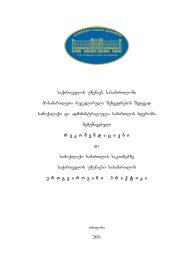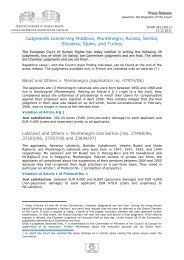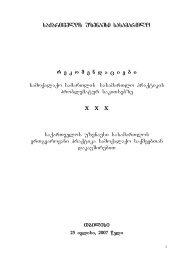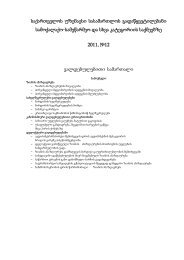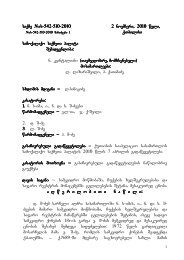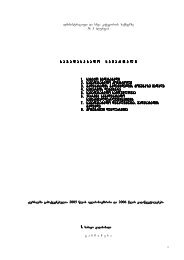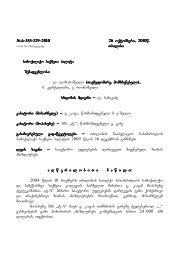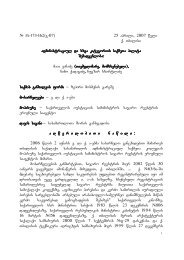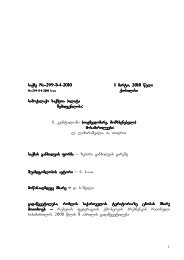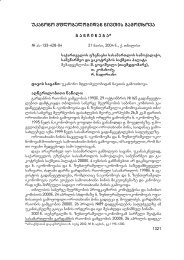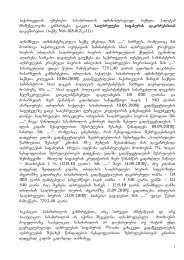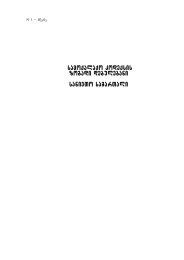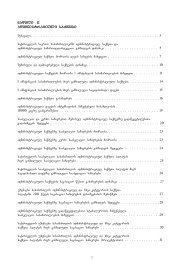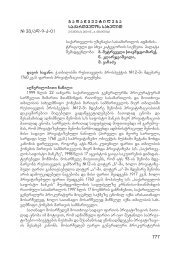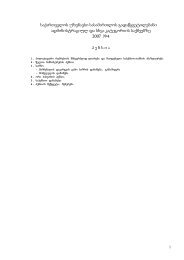doqtoranta forumiconclusion, the decisive significance is given to freedom of expression of the will by the parties, what isclosely related to autonomy of expression of will. E. g. the spouses, by the marriage agreement, may determinethe agreement regime of the property. If they fail to achieve such agreement, the property regime providedfor by the law shall apply.Equality of the participants of the civil legal relations implies equal criteria of emergence, change andtermination of the civil rights, irrespective of material social inequality of their carriers, irrespective of theorganizational-employment relations with one another, as well as equal criteria for civil delinquency. 7The norms regulating the marriage agreements and generally, the family relations, have basicallydispositional nature. As for individual situational regulation, here are considered so called unlimited norms.These are the cases, when the legal norms shall be interpreted on the basis of situational analysis. E. g.in accordance with Section 2 of Article 1179 of the Civil Code of Georgia: the agreement may not provide forsuch conditions, which put one of the spouses into the heavy condition. What is implied under the heavycondition, is thew issue of individual assessment, which should be determined as a result of study ofvarious factors and circumstances.As M. Antakolskaia notes, by strengthening of the dispositional principle in regulation of the family relationstherpossibility of situational regulation from the side of the participants of family relations was widened as well. 8Generally, the marriage agreement is made for unlimited period, though, upon agreement between theparties, its effectiveness may be limited to certain term, e. g. 5 or 10 years.Rights and obligations provided for by the marriage agreement may be limited to certain term or byemergence of one or another condition.Based on the legislation, theoretically, there is possibility that if the marriage agreement was made beforeregistration of marriage, it did not become legally effective at all, or for quite long period of time. For thistime, it continues to exist, but it does not cause any legal outcomes. If the parties register their marriage e. g.after 5 years, for them, the agreement of 5-year age will obtain legal force.In accordance with legislation of Belarus, marriage agreement may be executed only after marriageregistration, at any time. We regard that in practice there will be very rare cases, when execution of themarriage agreement is necessary before marriage registration, as the marriage agreement without registrationcreates no rights and obligations, Article 1173 could be regarded as the least realized regulation.Parties to the marriage agreement are spouses, or persons to be married, or the point of law subject leadsto the condition necessary for marriage. According to the Civil Code, this includes maturity and legalcapacity. A person becomes mature from 18-year age though the law provides for the exception, whenmarriage age is decreased to 16. It is interesting, if a person, who is not mature, decides to make the marriageagreement, whether his/her consent will be enough? It would be reasonable to require consent of theparents or the legal representative. If neither parents and nor legal representatives’ consent is provided, thefinal decision should be made by the court. If the court issues permission on marriage of the under-agedpersons, it would provide adequate legal basis for the marriage agreement. Comments to the Civil Codeprovide the different opinion. The author thinks that if the parents are against marriage of under-aged childand the court issues the permission for marriage, this should not imply that this person has right to make themarriage agreement before registration of marriage. This is possible only when the court expressly providefor this, in its decision. Upon registration of marriage, as it is well known, the under-aged person (spouse)acquires full legal effectiveness and he/she may make marriage agreement indecently.It is interesting, whether the emancipated under-aged person, if he/she decides to get married, has rightto make the marriage agreement? We think that to this question we should give the negative answer. Asemancipation implies unlimited legal effectiveness only in the entrepreneurial relations, in the other spheres,such person, generally, requires the necessary consent of the legal representative.7See «Civil Law:, part I, 2002, editors: A. G. Kalpin and A. I. Maslyaev, p. 23.8See. Antokolskaia M. B., Family Law, 1998, pp. 13-21.86
marTlmsajuleba, 2008, #3Persons in the actual marriage may not be the parties to the marriage agreement. If they execute suchagreement and later they register the marriage with the body of registration of the civil acts, the agreementwill acquire the legal force only after such registration.Thus, the subjects of the marriage agreement are the spouses and the persons, who intend to getmarried. In the law literature there are stated different opinions, whether it is acceptable to make marriageagreement based on the power of attorney. S. Bondov thinks that execution of the marriage agreementthrough the attorney, if the power of attorney is executed adequately, containing key terms and conditionsof the marriage agreement, is fully acceptable, regarding the property nature of the deal. 9We share the opinion of the number of authors, stating that the marriage agreement is an agreement ofprivate nature and it should not be executed by lawful representative or attorney of a spouse. 10Co-authors – Muratova – Tarsamaeva regard that the specific nature of the family relations is theirpersonal nature and it is impossible to transfer the family rights and obligations. Therefore, the marriageagreement should not be made on the basis of the power of attorney. 11Marriage is the most typical way of creation of the family legal relations. Marriage is followed by creationof a family. In legal relations, the marriage has the significance of the juridical fact with complicated complexnature. One of the elements of the composition of legal fact is registration of marriage. 12In accordance with Georgian Civil Code, the marriage agreement may be executed at any time, both, beforeand after registration of marriage, though, the legislator makes a proviso, which is absolutely reasonable: amarriage agreement executed before registration of marriage shall enter into force from the date of registration.Thus, for execution of the agreement marriage is required; implying registered marriage. As for the actualrelations (without registration) they lack the opportunity of making the marriage agreement. We can not agreewith M. Antakolskaia, who thinks that as the civil legislation does not know the full list of the agreements, theactual spouses may make the agreement directed to regulation of the property relations as well. “If suchagreements comply with the law, than they could be regarded as legally correct. By similarity of law, theregulations on the marriage agreements could be categorized as such. Though, it is necessary to bear in mindrequirement of the Code stating that the joint property emerge by virtue of law and may not be created on thebasis of the agreement. Consequently, the actual spouses may not establish co-ownership of the property,acquired during the actual marriage, though, taking into consideration dramatic growth of the number of actualmarriages, it would be quite reasonable to allow the actual spouses to make the marriage agreements”. 13Modification and termination of the marriage agreement is provided just in the same way as its execution– in written, with necessary notarization.Written form of the marriage agreement is required by the legislations of European countries as well. InFrance, it is necessary to notarize the marriage agreement, in Italy it shall be registered with local governmentalbody in charge of registration of real property. 14 Here we should mention an issue of great significance,dealing with the relation between the owner of real property specified in the marriage agreement and recordsin the public registry - collision between the family law and material law regulations. With respect of theabove, current court practice is of interest.Great Department of the Supreme Court, by the decision of 9 th December 2002, deemed that regarding theinterests of the acquirer, the property rights of the spouses on the real property specified in Article 1158 ofGeorgian Civil Code, acquired jointly, is created only upon registration of both of them in the public registry,otherwise, the records of the public registry, with respect of the third parties shall be deemed correct 159See: Bondov S. N., Marriage Agreement, 2001, p. 58.10See: Chikvashvili Shalva, Family Law, Tbilisi, 2000, p.143.11See Muratova S. A., Tarsamaeva N. Yu., work specified above, p.93.12See: Vorozheikin, Legal Principles of the Marriage and Family, 1969, p. 18.13See. Antokolskaia M. B., Family Law, 2002, pp. 158-159.14See: Damirchieva Makhabat, Dairman Kizi, Marriage Agreement, 2003, p. 85.15Decisions of the Supreme Court of Georgia, on the Civil, Entrepreneur and Bankruptcy Cases, #2, 2005, p.35 I refer to:Eka Zarnadze “Some Peculiarities of Resolution of the Disputes on Management and Disposal of the Real PropertyAcquired jointly, in the period of marriage”. Magazine “Overview of Georgian Law”, #10, 2007, pp. 120-124.87
- Page 1 and 2:
marTlmsajuleba, 2008, #3saqarTvelos
- Page 3 and 4:
marTlmsajuleba, 2008, #3s a r C e v
- Page 5 and 6:
marTlmsajuleba, 2008, #3TanagrZnobi
- Page 7 and 8:
marTlmsajuleba, 2008, #3sasamarTlo
- Page 9 and 10:
marTlmsajuleba, 2008, #3_ sxva prog
- Page 11 and 12:
marTlmsajuleba, 2008, #3sasamarTlos
- Page 13 and 14:
marTlmsajuleba, 2008, #3saqarTvelos
- Page 15 and 16:
marTlmsajuleba, 2008, #3sazogadoebr
- Page 17 and 18:
marTlmsajuleba, 2008, #3venis konve
- Page 19 and 20:
marTlmsajuleba, 2008, #3konvenciis
- Page 21 and 22:
marTlmsajuleba, 2008, #3venis nasyi
- Page 23 and 24:
marTlmsajuleba, 2008, #3zaza nadara
- Page 25 and 26:
marTlmsajuleba, 2008, #3sastiki moq
- Page 27 and 28:
marTlmsajuleba, 2008, #3Sesaxeb rf-
- Page 29 and 30:
marTlmsajuleba, 2008, #3saxelmwifo
- Page 31 and 32:
marTlmsajuleba, 2008, #3eklesia da
- Page 33 and 34:
marTlmsajuleba, 2008, #3mosaxleobis
- Page 35 and 36: marTlmsajuleba, 2008, #3dros pirs s
- Page 37 and 38: marTlmsajuleba, 2008, #3rom gulgril
- Page 39 and 40: marTlmsajuleba, 2008, #3ganzraxvis
- Page 41 and 42: marTlmsajuleba, 2008, #3giorgi lanC
- Page 43 and 44: marTlmsajuleba, 2008, #3„danaSaul
- Page 45 and 46: marTlmsajuleba, 2008, #3sxvadasxva,
- Page 47 and 48: marTlmsajuleba, 2008, #3aRniSnuli d
- Page 49 and 50: marTlmsajuleba, 2008, #3katebisa da
- Page 51 and 52: marTlmsajuleba, 2008, #3rom erTi da
- Page 53 and 54: marTlmsajuleba, 2008, #3sanam kompi
- Page 55 and 56: marTlmsajuleba, 2008, #3axla ganvix
- Page 57 and 58: marTlmsajuleba, 2008, #3cnobilia, r
- Page 59 and 60: marTlmsajuleba, 2008, #3saSualebas
- Page 61 and 62: marTlmsajuleba, 2008, #3gadaxdis sa
- Page 63 and 64: marTlmsajuleba, 2008, #3am uflebis
- Page 65 and 66: marTlmsajuleba, 2008, #3Taobaze. Cv
- Page 67 and 68: marTlmsajuleba, 2008, #3gamoyenebiT
- Page 69 and 70: marTlmsajuleba, 2008, #3ar ekrZaleb
- Page 71 and 72: marTlmsajuleba, 2008, #3programis m
- Page 73 and 74: marTlmsajuleba, 2008, #3daskvnasaqa
- Page 75 and 76: marTlmsajuleba, 2008, #3nana naWyeb
- Page 77 and 78: marTlmsajuleba, 2008, #3i. funkic T
- Page 79 and 80: marTlmsajuleba, 2008, #3qorwinebis
- Page 81 and 82: marTlmsajuleba, 2008, #3nivTebze me
- Page 83 and 84: marTlmsajuleba, 2008, #3winamdebare
- Page 85: marTlmsajuleba, 2008, #3According t
- Page 89 and 90: marTlmsajuleba, 2008, #3As recommen
- Page 91 and 92: marTlmsajuleba, 2008, #3distanciura
- Page 93 and 94: marTlmsajuleba, 2008, #31. pasuxism
- Page 95 and 96: marTlmsajuleba, 2008, #3mens rea-s,
- Page 97 and 98: marTlmsajuleba, 2008, #3warmoadgens
- Page 99 and 100: marTlmsajuleba, 2008, #3MARIAM JIKI
- Page 101 and 102: marTlmsajuleba, 2008, #3The signifi
- Page 103 and 104: marTlmsajuleba, 2008, #34. Instigat
- Page 105 and 106: marTlmsajuleba, 2008, #3mixeil gabu
- Page 107 and 108: marTlmsajuleba, 2008, #3bunebrivi,
- Page 109 and 110: marTlmsajuleba, 2008, #3mizanSewoni
- Page 111 and 112: marTlmsajuleba, 2008, #3processac.
- Page 113 and 114: marTlmsajuleba, 2008, #3politikis h
- Page 115: marTlmsajuleba, 2008, #3kiberdamnaS



